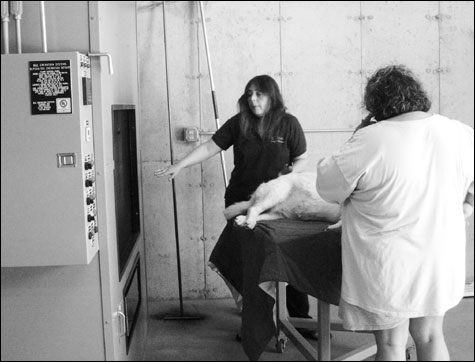
MOJO'S LAST MOMENTS: With Desrosier (left) and Cheri Lavoie. |
When Mojo was born, her biological mother didn’t want to have anything to do with her. So, as a mother dog might have done, Cheri Lavoie bit open Mojo's placenta, to ensure that the puppy could breathe. On July 3, eleven years after helping bring her into the world, Lavoie helped put Mojo's body into the cremation retort (a/k/a the oven) where the 130-pound dog would meet her final end, her body transformed from flesh and bone into, well, little bits of bone and ash.
Lavoie’s final moments with Mojo's remains, which took place at the Fluke’s Aftercare pet crematorium in Litchfield, were a fitting tribute to their 11-year human-animal bond. For one thing, Mojo was physically honored: fur clippings were taken from her body, and her inky paw print was impressed onto paper and onto Lavoie’s hand. But more important was the air of reverence that surrounded the entire procedure, from when Lavoie arrived — straight from the vet, with Mojo’s euthanized body in the back of the car — to when the time came to bid a final farewell to the dog.
“Do you want a few moments alone with her?” asked Linda Desrosier, half of the husband-wife team that runs Fluke’s. After a few seconds of respectful silence, the two women heaved Mojo’s body into the retort. The door, like one for a garage, slid closed. And the oven started to pre-heat.
Throughout the morning, Lavoie expressed how grateful she was that Desrosier, and her business, exist. “I’m glad that you’re here,” she said. “There aren’t enough people like you in the world.”
Indeed, it was for that reason that Desrosier and her husband John started Fluke’s Aftercare in 2003. When their five-year-old shepherd-hound “fur-baby,” Fluke, died of lymphoma that year, they searched far and wide for “a place like us to bring him to,” Desrosier says — an establishment that offered personalized, homey services and treated the pet, the owner, and the grief with due respect. The closest one was in New Brunswick, Canada, so the Desrosiers were forced to bring Fluke to a local crematorium, where his dog body was placed in a freezer, and where — though they received assurances to the contrary — Fluke may have been cremated at the same time as other pets; his cremains may not even be wholly him. The whole experience was impersonal and upsetting, Desrosier says. “I got Fluke back in a white cardboard box, and he deserved a lot more than that.”
And so the couple took the do-it-yourself outlook to a whole new level. They borrowed money to build a licensed crematorium on their 88 acres in Litchfield; they researched urn manufacturers, bought a $50,000 retort, and took an online course in bereavement counseling. Over the past five years, they’ve made their living cremating hundreds of animals — mostly dogs and cats, but also a few pot-bellied pigs, and iguanas, a turtle, and a llama.
Every client gets their loved one’s cremains back in either a carved wooden box or a floral tin, along with a cremation certificate (which promises the animal was cremated alone, if that’s what the owner desires), stamped with the animal’s paw (or claw?) print. They get fur clippings. And they can choose whether they want the cremains “processed” — ground down into a fine chalky powder — or simply as they come out of the retort, as small chunks of grey bone. (Lavoie chose to take Mojo’s remains unprocessed; the amateur artist’s plan is to grind some of them herself, then mix those ashes with paint and use them to create a work of art inspired by her dead loved one.)
If all this seems freakishly maudlin, you’re probably not a member of one of the 71.1 million American pet-owning households that are increasingly obsessed with their furry (or scaly) friends (45 percent of those have more than one pet). To understand why people would patronize Fluke’s Aftercare or similar establishments, we have to examine the ever-deepening bond between humans and their domestic animals.
According to the American Pet Products Manufacturing Association, Americans will spend an estimated $43.4 billion on pet products and vet visits this year, almost double what we spent a decade ago. Pets are increasingly welcome at hotels and spas, or even at work; high-end food products and grooming services, along with luxury “clothing,” filtered-water-bowl contraptions, and implanted identification chips are ever more commonplace. Here in dog-obsessed Portland, none of this should come as a surprise.
And if we pamper them in life, why shouldn’t we be expected to treat them extravagantly when they die? Cremation and specialty pet urns are one option (Fluke’s cremations cost between $150 and $250); classy pet cemeteries (nothing like the DIY backyard burials of yore) are another. In Auburn, for example, the Canines and Cats Pet Cemetery offers “a full line of caskets and urns,” which are interred and marked by simple graves. Some pet owners even choose to taxiderm their beloved friends.